Getting a medical certificate for time off work or school sounds simple enough. But what if you need one for days you were already sick?
A lot of people wonder if doctors can backdate these important documents to cover past illness periods.

Backdating medical certificates is illegal and considered a form of fraud that can lead to serious consequences for both doctors and patients. Medical professionals cannot backdate certificates because it suggests they knew about your condition on a date when they actually did not see you.
This practice undermines the integrity of medical records and breaks professional standards.
Still, things aren’t always so clear cut. Doctors can’t backdate certificates to past dates, but they can write certificates on the current date that mention your reported illness from earlier days.
Key Takeaways
- Backdating medical certificates is illegal and counts as fraud with serious legal consequences
- Doctors can issue current-dated certificates referencing your past illness based on what you report
- Using fraudulent medical certificates can mean losing your job, facing legal action, and other harsh penalties
What Is a Backdated Medical Certificate?
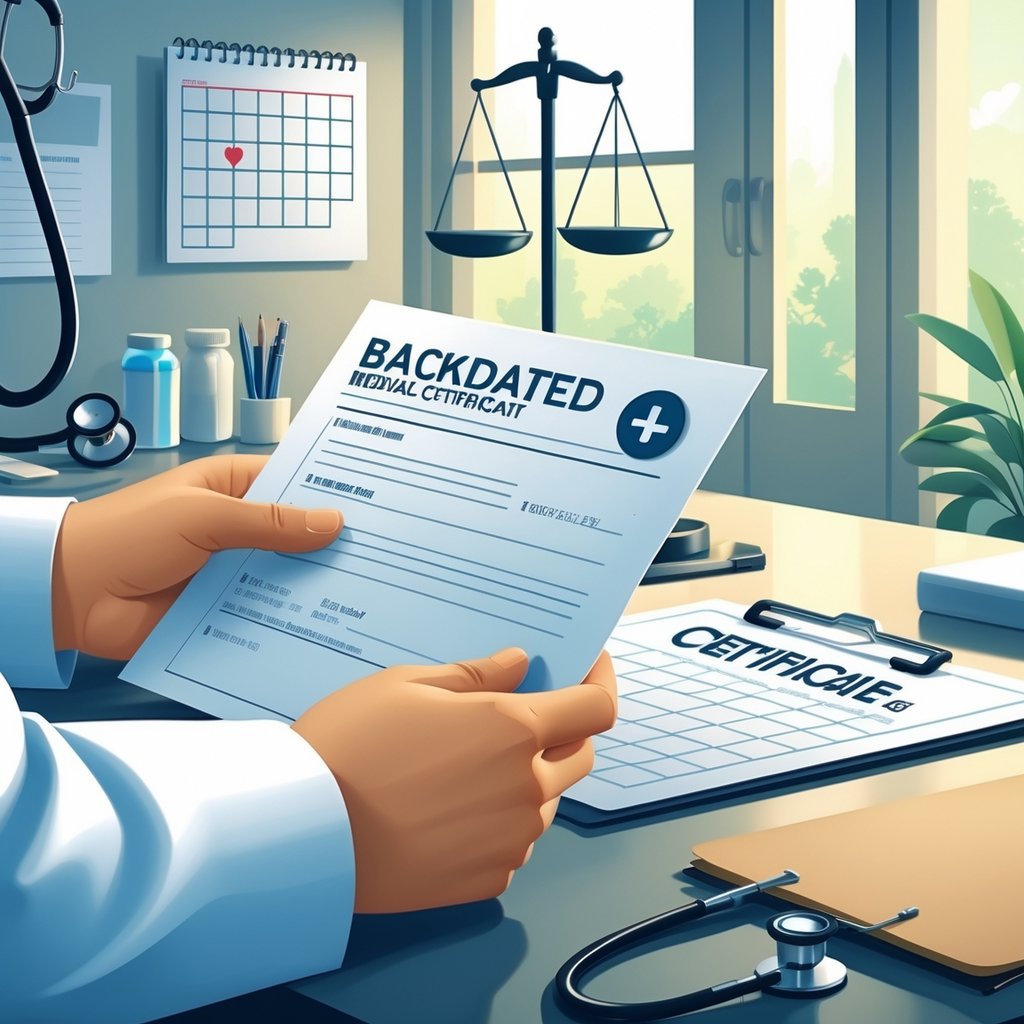
A backdated medical certificate is a document that shows illness on a past date. These certificates create legal and ethical issues that regular medical documentation doesn’t.
Definition of Backdating
Backdating means putting a date on a medical certificate that comes before the doctor actually saw you. It creates documentation for a time when no medical exam happened.
A backdated certificate is a document from a healthcare provider claiming you were sick on a specific past date. The certificate gets dated before your real visit to the doctor.
Key characteristics of backdating:
- Certificate date set before your consultation
- Claiming medical knowledge of past conditions
- Creating records without direct observation
- Misrepresenting the timeline of illness
Most medical professionals see this as a problem. Standard medical documentation rules require honest dating.
Common Scenarios for Backdated Certificates
You might ask for backdated certificates in a few situations. The most common is needing proof of illness after missing work or school.
Typical scenarios:
- Missing work because of sudden illness and not seeing a doctor right away
- Forgetting to get a certificate during sick days
- Employer asks for documentation after the fact
- School absence policies want medical proof
Some people try to get backdated certificates for insurance claims. Others want them for legal proceedings needing medical proof.
Warning signs:
- Asking for certificates for dates weeks in the past
- Requesting documentation with no clear medical history
- Pressure to create false records
- Using certificates for non-medical absences
These situations put you and your doctor at risk for legal trouble.
Key Differences Between Standard and Backdated Medical Certificates
Standard medical certificates follow clear documentation rules. Backdated ones break these practices in important ways.
| Standard Medical Certificate | Backdated Medical Certificate |
|---|---|
| Dated on consultation day | Dated before actual visit |
| Based on direct examination | Relies on patient reports only |
| Legally compliant | Often legally questionable |
| Ethically sound | Raises ethical concerns |
| Widely accepted | May face scrutiny |
A regular certificate shows what your doctor saw during your visit. The date matches when you got care.
Backdated certificates create documentation gaps. Your doctor has to rely on your description of past symptoms instead of what they actually saw.
Legal implications are big:
- Standard certificates have full legal protection
- Backdated versions can face legal challenges
- Employers can check certificate authenticity with clinics
- False certificates can mean serious consequences
Accurate dating and good documentation keep medical records trustworthy.
Legal Implications of Backdating Medical Certificates
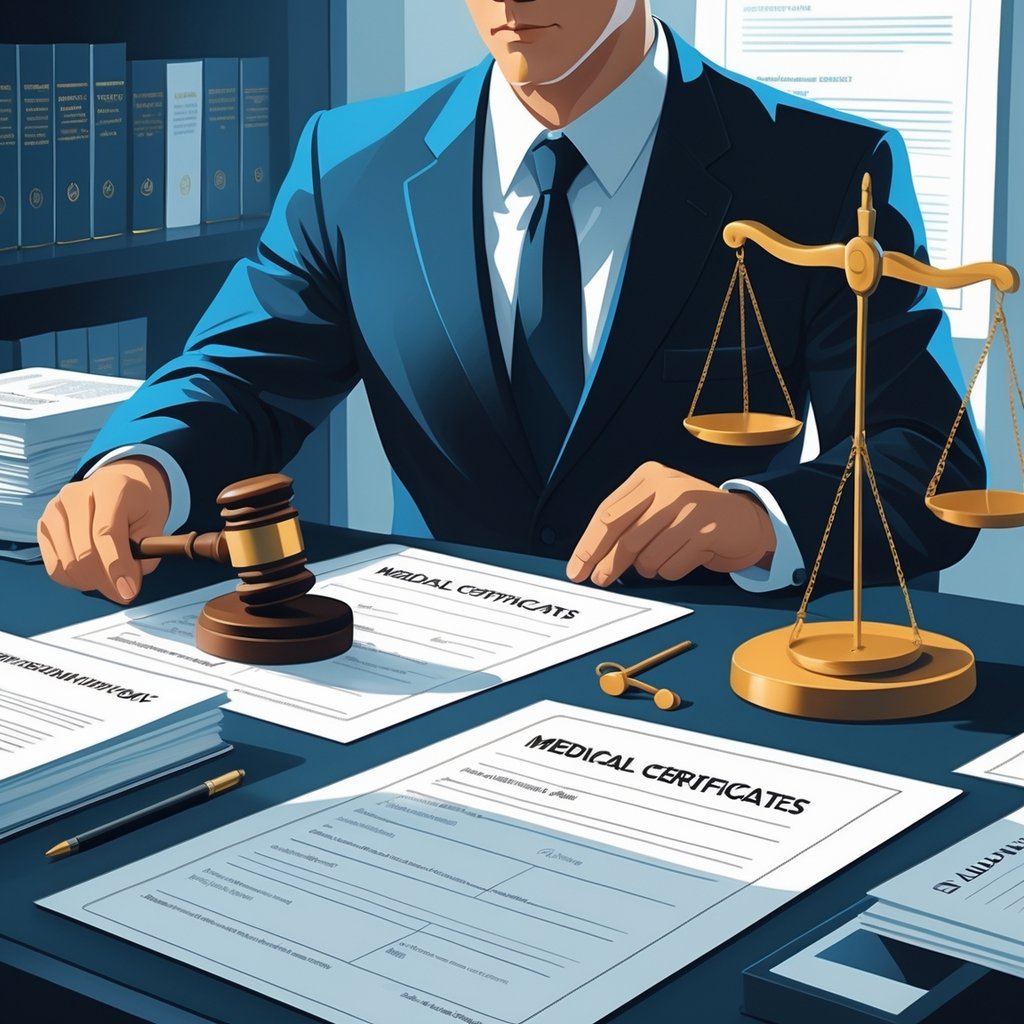
Backdating medical certificates breaks medical documentation laws and can lead to serious legal trouble for both patients and healthcare providers. It can bring fraud charges, professional sanctions, and employment fallout.
Laws Governing Medical Documentation
Medical documentation must follow strict legal standards. Healthcare providers have to record accurate dates and times for every patient interaction.
Medical certificates can’t be legally backdated because they must show the real date of consultation or treatment. This rule shows up in medical licensing laws almost everywhere.
Professional medical boards enforce these documentation standards. Certificates only certify what a doctor observed on the actual examination date.
Key legal requirements:
- Accurate dating of all documents
- Truthful account of patient encounters
- Clear documentation of exam findings
- Good record-keeping
Falsifying medical records violates state medical acts and federal healthcare laws. These violations can trigger investigations from licensing boards and law enforcement.
Potential Legal Penalties for Patients
Patients using backdated certificates face several legal risks. Using fake medical certificates can mean disciplinary action from employers including getting fired.
Possible penalties:
- Employment: Immediate termination or suspension
- Education: Expulsion or academic penalties
- Legal: Fraud or misrepresentation charges
- Financial: Fines or restitution
Criminal charges might apply in serious cases. Fraud charges can mean jail time depending on where you live and what happened.
Insurance fraud is another big risk. If you use a backdated certificate for insurance claims, you could face federal fraud charges with heavy penalties.
Legal Consequences for Healthcare Providers
Healthcare providers face even tougher legal consequences for issuing backdated certificates. Doctors who write false or misleading certificates can face misconduct charges and action from medical boards.
Professional consequences:
- Suspension or loss of medical license
- Required ethics training
- Practice restrictions or supervision
- Harm to professional reputation
Criminal liability is real for healthcare providers. Issuing false documentation counts as fraud in most places.
Civil lawsuits can happen too. Employers or institutions hurt by fake certificates might sue the doctor for damages.
Malpractice insurance usually doesn’t cover legal costs for fraudulent documentation. This can leave providers personally responsible for all legal bills and damages.
Ethical Considerations in Issuing Medical Certificates
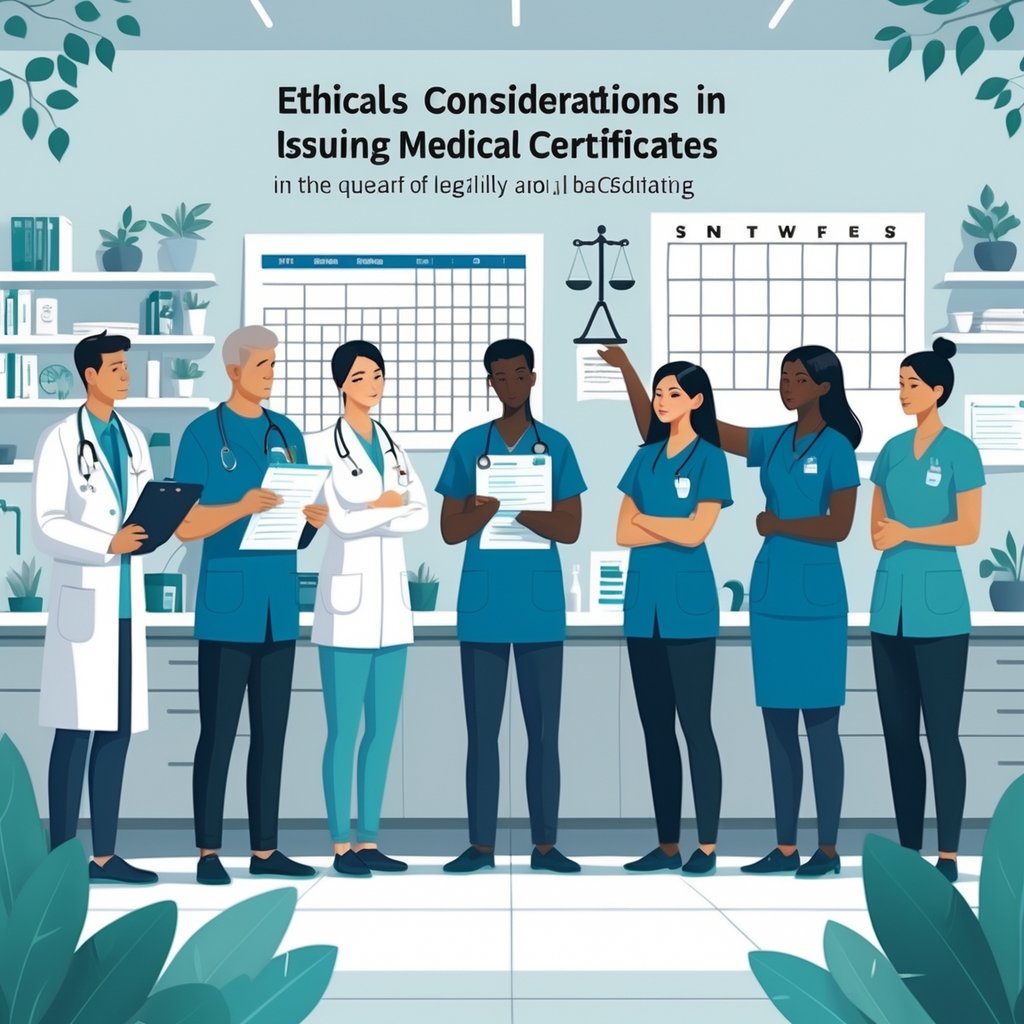
Healthcare providers have to meet strict ethical standards when issuing medical certificates. These rules protect professional integrity and keep public trust in medical documentation.
Ethical Obligations of Healthcare Providers
Your main ethical duty as a healthcare provider is truthfulness and accuracy. Certify only what you observed during your exam or consultation.
Medical certificates can’t be legally backdated beyond what you can justify clinically. Backdating suggests you knew about a patient’s condition on a date you never saw them.
Key ethical principles:
- Honesty: Document only what you directly observed
- Accuracy: Use the real date of consultation
- Professional integrity: Keep medical records authentic
You need to separate current assessments from historical information. When documenting past illness, say clearly that your certificate is based on patient history and what you see now.
The ethics of medical certification differ from regular treatment. Sometimes you act for employers, institutions, or as patient advocates.
Impact on Trust and Professional Reputation
Issuing inaccurate certificates can destroy your professional standing. Misconduct charges and license suspension are real risks for fraudulent documentation.
Your reputation matters beyond your own practice. Patient trust in the medical profession drops when certificates get misused or faked.
Professional fallout:
- Disciplinary action from boards
- Loss of license
- Civil and criminal charges
- Reputation damage
Careless certificate issuance leads to misuse and weakens the document’s credibility. Employers and institutions count on your judgment when they accept these certificates.
Keep confidentiality and make sure you’re accurate. Hold on to copies of certificates you issue and be able to explain any unusual situations.
Guidelines from Medical Associations
Medical associations offer guidance on certificates. Post-dated certificates aren’t the norm but sometimes work if you can justify them.
Your professional code says you should provide certificates when patients ask for health documentation. Still, you can use your clinical judgment to decide if it’s appropriate.
Standard guidelines:
- Date certificates on the exam day
- Give clinical reasons for unusual cases
- Keep accurate records
- Protect patient confidentiality
Article 12 of medical ethics codes gives patients the right to health certificates. Balance this with your ethical duty to keep documents honest.
When describing retrospective illness, state clearly what your assessment is based on. Say if your current findings match what the patient reports from earlier dates.
Legitimate Situations for Retrospective Medical Certificates
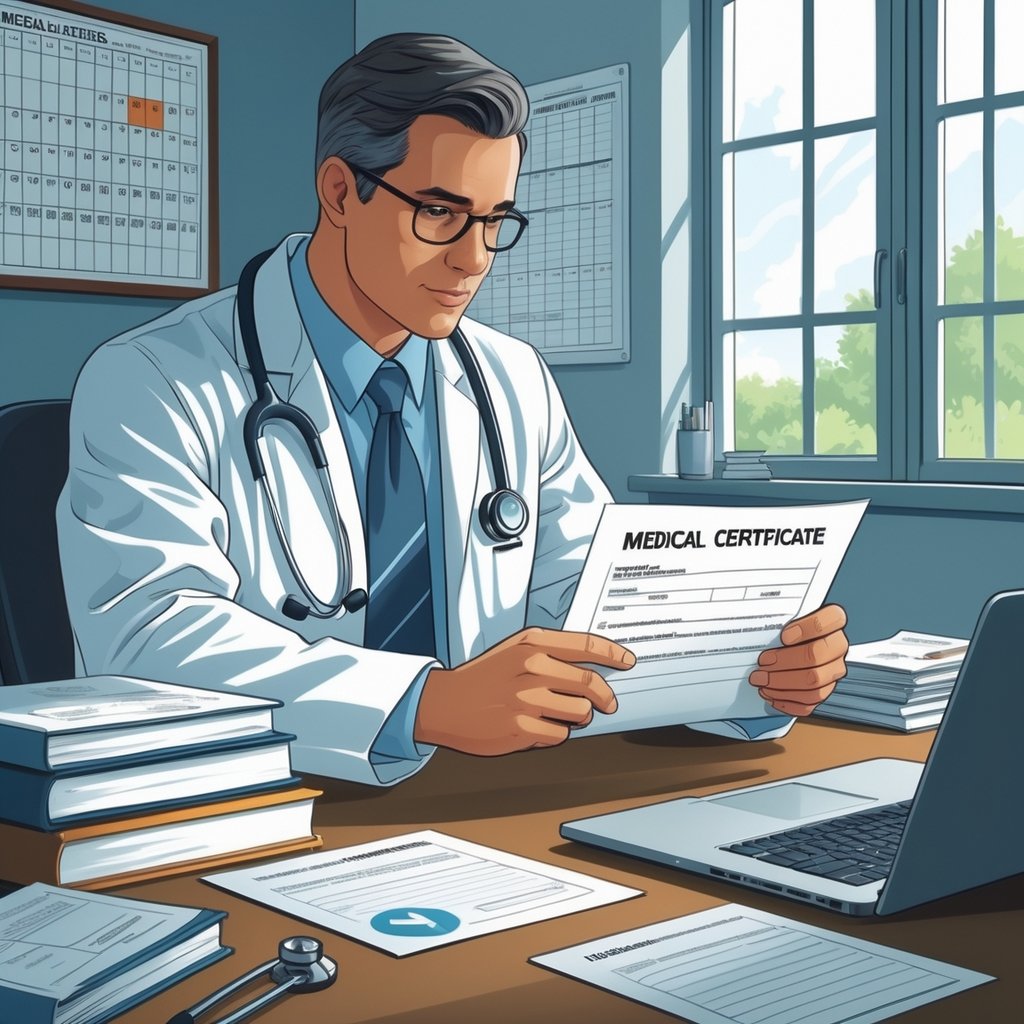
Backdating medical certificates usually raises ethical concerns. Still, some situations justify retrospective certification when you can’t see a doctor right away.
Professional assessment keeps things legal and helps you meet workplace requirements.
When Retrospective Certification May Be Justified
A few valid situations call for a backdated certificate. You might have a sudden severe illness that keeps you from seeing a doctor right away.
Emergency situations include:
- Acute food poisoning that keeps you in bed
- Severe migraine making it impossible to travel
- Mental health crisis that stops you from functioning
- Family emergency that needs your attention
Remote locations can also justify retrospective certificates. If you get sick while traveling or in a place with limited medical care, you might have to wait to see a doctor.
Weekend and holiday illnesses often need retrospective documentation. Many clinics close during these times, so you have to wait for regular hours.
Backdated medical certificates online might work after a proper consultation.
Procedures for Requesting Valid Retrospective Certificates
Contact your healthcare provider as soon as you can after you get sick. Explain your situation and why you couldn’t see a doctor right away.
You’ll usually need:
- A timeline of your symptoms
- Witness statements if you have them
- Proof of travel or emergencies
- Past medical history that supports your case
Try to schedule an appointment within a couple of days of getting sick if you can. Many online doctors offer backdated certificates after a thorough consultation.
Be honest and give detailed information about your illness. Doctors need your description and timing to make a fair assessment.
Don’t ask for backdating for:
- Minor illnesses you could have worked through
- Forgetting to see a doctor out of convenience
- Covering up absences that weren’t for medical reasons
Employer and Institutional Policies
Check your workplace sick leave policies before you request backdated medical certificates. Some employers accept retrospective documentation, while others want same-day certificates only.
Common employer guidelines include:
- Maximum 2 or 3 day backdating period
- Emergency circumstance explanation required
- Extra documentation for long absences
- HR approval for retrospective certificates
Educational institutions usually have similar rules. Universities and schools sometimes accept backdated certificates for missed exams or late assignments.
Legitimate healthcare providers only issue retrospective certificates when they’re medically justified. They try to accommodate genuine needs but won’t risk their professional standards.
Keep records of everything you send your employer about backdated certificates. Save copies of your medical certificates and any approvals you get.
Risks and Consequences of Using Backdated Certificates
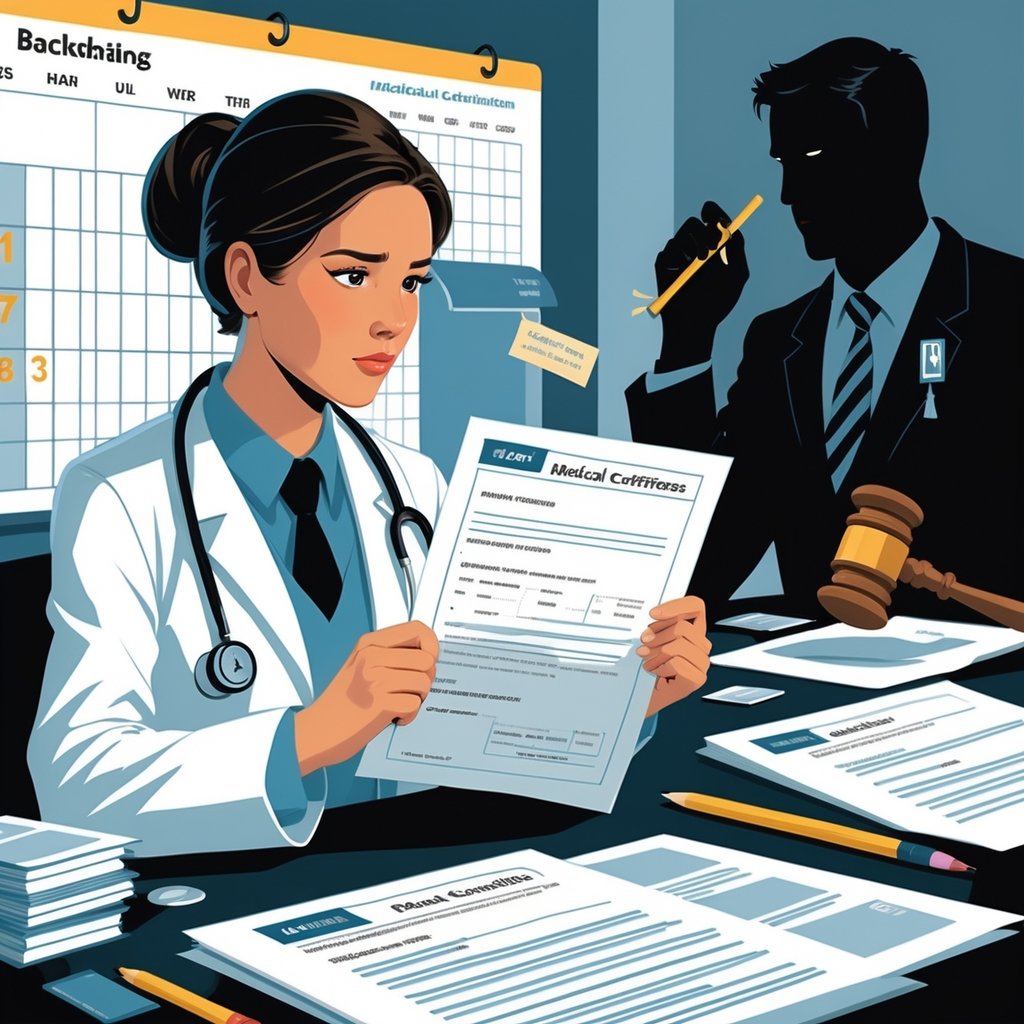
Using backdated medical certificates can bring serious legal, professional, and work consequences. Medical certificates can’t be legally backdated, and trying to do so risks fraud charges, job loss, and professional sanctions for healthcare providers.
Fraud and Falsification Risks
Backdating a medical certificate is often considered fraudulent, especially if you’re trying to deceive an employer or school. You could face criminal charges if authorities think you intentionally faked documents.
The legal system takes document falsification seriously. Penalties might include fines or jail time, depending on where you live and how severe the case is.
Assigning earlier dates to documents puts you at risk for fraud and regulatory violations. Insurance companies can deny claims if they find out you used a backdated certificate.
Civil lawsuits from employers or insurers are possible if they lose money because of false documentation. Even if you avoid criminal conviction, legal defense can get expensive fast.
Employment and Insurance Outcomes
Employers can reject medical certificates that look suspicious. A backdated medical certificate often raises a red flag, especially if you use it to claim leave or compensation.
Employment consequences include:
- Immediate termination for false documents
- Loss of sick leave benefits and compensation
- Damaged professional reputation hurting future job chances
- Breach of employment contract that could lead to legal action
Insurance companies investigate claims closely. They can void your policy, deny your claims, and refuse future coverage if they spot fraudulent medical certificates.
Your employer might report you to licensing boards or law enforcement. That can follow you for years in your career.
Professional Sanctions Against Providers
Healthcare providers face tough penalties for issuing backdated certificates. Most doctors in Australia avoid backdating certificates because of legal risks.
Medical licensing boards can do the following:
- Suspend or revoke licenses
- Impose heavy fines
- Order mandatory ethics training and supervision
- Publicly censure providers and damage their reputation
Healthcare professionals need to stick to ethical standards and issue certificates with accurate dates. Backdating goes against professional ethics and can ruin a provider’s reputation.
Professional indemnity insurance usually won’t cover legal costs from fraudulent document creation. Providers might have to pay out of pocket for lawsuits or regulatory penalties.
The medical community has strict standards. Colleagues and organizations may ostracize doctors who engage in fraud.
Online Medical Certificates: Verification and Compliance
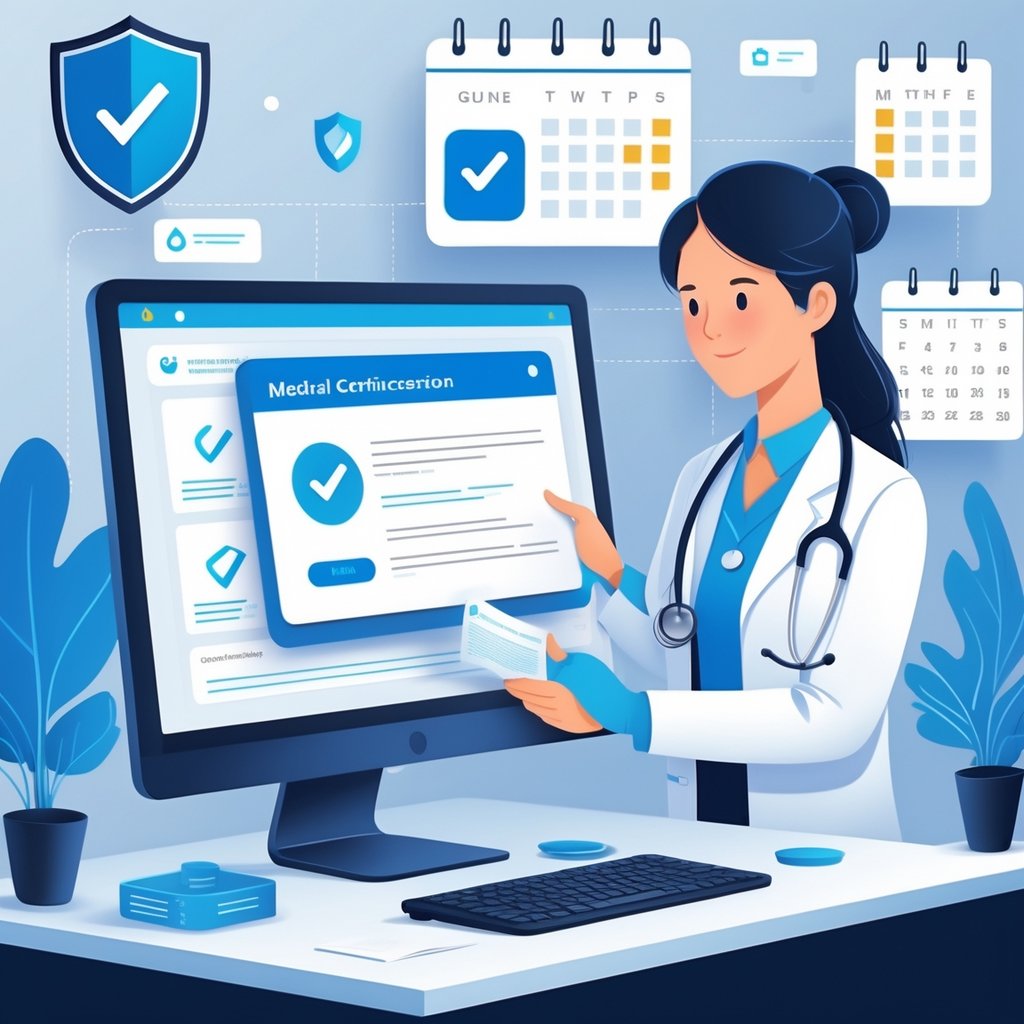
Online medical certificates should meet the same legal standards as paper ones. Verification methods are important to make sure they’re authentic. Knowing how to spot real documentation and report fraud protects everyone from legal trouble.
Legal Standards for Online Medical Certificates
Online medical certificates are valid if a licensed healthcare provider issues them after a proper consultation. The certificate should come from a real doctor-patient consultation, not just a quick online form.
Key Requirements:
- Real-time consultation (video or phone)
- Licensed medical practitioner
- Proper patient assessment
- Accurate date of consultation
Check with your HR department before using an online certificate for work absences. Some employers have specific rules about digital certificates.
The certificate should include the doctor’s details, your info, and the consultation date. Missing details can make the certificate worthless for legal purposes.
How to Identify Authentic Certificates
Genuine online medical certificates have certain elements that set them apart from fake ones. Always check for the doctor’s registration number and practice details.
Verification Checklist:
- Doctor’s full name and registration number
- Medical practice name and address
- Digital signature or stamp
- Date and time of consultation
- Patient identification
You can look up the doctor’s credentials on your local medical board website. Search their registration number to confirm they’re legit.
Real telehealth platforms provide contact info for verification. If a certificate lacks proper contact details or uses a fake practice name, be cautious.
Don’t trust certificates issued without any consultation or exam. Legitimate services require a real consultation between doctor and patient.
Reporting Suspicious or Fraudulent Documentation
Report fraudulent certificates to your local medical board if you suspect illegal activity. This helps protect others and keeps the medical system honest.
Reporting Steps:
- Contact your state medical board
- Provide certificate details and evidence
- Include info about the suspected doctor
- Add witness statements if you have them
Let your employer or school know about any suspicious certificates. They can investigate and stop future fraud.
Keep copies of all fraudulent documents for legal reasons. Take screenshots of websites selling illegal backdated certificates as proof.
Law enforcement handles big fraud cases, especially if there are many victims. If you find organized certificate fraud in your workplace or community, contact the police.
Frequently Asked Questions

Medical professionals can face serious penalties for backdating certificates. Patients risk losing their jobs and facing legal charges. Australian employment law and medical boards have strict rules about documentation dates.
What are the legal repercussions for altering the date on a medical certificate?
Changing dates on medical certificates can bring fraud charges for both doctors and patients. Doctors might face professional misconduct charges and lose their license.
Criminal penalties could include fines or even jail time. Civil lawsuits may follow if you use fraudulent documentation.
Patients using altered certificates risk getting fired or expelled from school. Legal consequences can come if employers or schools pursue fraud charges.
Is it permissible for a physician to issue a retroactive sick note?
Doctors can’t legally backdate medical certificates past the consultation date. Professional and ethical standards don’t allow it.
Doctors can issue current-dated certificates that mention past illness based on what the patient says. The certificate must clearly say it’s based on reported symptoms from a previous period.
The doctor only certifies what they observe during the consultation. Any mention of past illness needs to be clinically justifiable and supported by the current exam.
How does the Fair Work Act affect the issuance of backdated medical certificates?
The Fair Work Act says employees must provide genuine, accurately dated medical evidence for sick leave.
Fraudulent certificates break Fair Work Act rules about honesty between employers and workers. Employers can fire employees who submit fake medical proof.
The Act protects your right to sick leave, but you need legitimate medical documentation. Using backdated certificates can void your sick leave and put your job at risk.
What are the guidelines around medical documentation for employment purposes in Australia?
Australian medical boards expect doctors to issue truthful, accurate certificates. Certificates must reflect the doctor’s assessment at the time of consultation.
Doctors can note illness that started before the consultation, but they can’t backdate the exam date. The certificate should make this clear for employers.
Medical practitioners need to protect their professional integrity when issuing work-related documentation. Employers can check certificate details directly with the doctor who issued it.
Can a patient legally obtain a medical certificate with a retroactive date online?
Online medical certificates can’t be legally backdated. Digital consultations follow the same rules as in-person visits.
Telehealth providers must date certificates according to the actual consultation. Patients asking for backdated online certificates will probably get turned down by legitimate services.
Some sketchy online sites might offer backdated certificates illegally. Using these puts you at risk for legal trouble and disciplinary action at work.
What is the professional stance of medical boards regarding backdating medical documents?
Medical boards in Australia treat backdating medical certificates as professional misconduct. This practice undermines trust in the medical profession.
They can suspend licenses, issue fines, or even remove a doctor’s registration. Medical boards look into complaints about fraudulent documentation with real seriousness.
Professional medical organizations push for accurate record-keeping and honest patient assessments. Backdating just goes against the core principles of medical ethics and responsibility.












